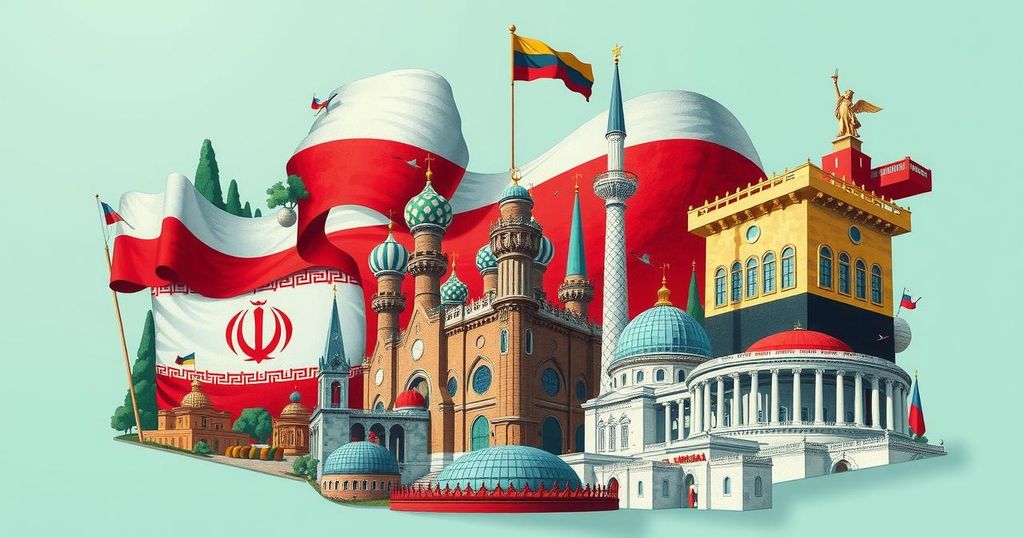Global news
ARBITRARY DETENTION, ASIA, COMMISSION OF INQUIRY ON SYRIA, CUBA, EUROPE, FACT - FINDING MISSION, FACT - FINDING MISSION ON IRAN, GENEVA, HO, HOSSAIN, HUMAN RIGHTS, HUMAN RIGHTS COUNCIL, HUMAN_RIGHTS, INTERNATIONAL LAW, IRAN, MAHSA AMINI, NORTH AMERICA, PINHEIRO, SHAHEEN ALI, SOUTH AMERICA, SWITZERLAND, SYRIA, UN HUMAN RIGHTS COUNCIL, VENEZUELA, WAR CRIMES
Fatima Khan
0 Comments
UN Human Rights Council Examines Violations in Iran, Syria, and Venezuela
Independent experts presented alarming reports on the human rights situations in Iran, Syria, and Venezuela during a recent UN Human Rights Council session. Notable issues included state repression and violence in Iran, the plight of missing persons in Syria, and electoral manipulation alongside arbitrary detentions in Venezuela. These findings underscore urgent calls for accountability and intervention in the face of systemic abuses.
Recent discussions at the UN Human Rights Council in Geneva have prominently focused on the human rights records of Iran, Syria, and Venezuela. Independent experts highlighted severe violations in these nations during the 47-member body’s latest session, particularly around the detrimental impacts of state repression following protests and ongoing humanitarian crises.
In Iran, experts reported serious infringements following protests driven by Mahsa Amini’s death. Sara Hossein, chair of the Fact-Finding Mission on Iran, noted that children faced life-threatening injuries from metal pellets during peaceful protests, and many endured horrifying treatment in detention, including torture. She expressed concern over the Iranian government’s ongoing repression and its failure to acknowledge calls for justice and equality.
The report emphasizes a pervasive atmosphere of intimidation in Iran against victims and their families. Shaheen Ali from the Fact-Finding Mission emphasized victims’ lack of faith in Iran’s judicial system, underscoring the urgent need for accountability measures beyond the country to pursue justice. The Iranian delegation has, however, vehemently opposed the report’s conclusions, emphasizing their disagreement.
Syria’s ongoing humanitarian crisis was also addressed, with Paulo Pinheiro, head of the Commission of Inquiry, calling for heightened efforts to reveal the status of tens of thousands of missing individuals. He noted the dire economic conditions in Syria while expressing optimism about new caregiver authorities’ collaboration on human rights matters. However, he urged for an end to sanctions that deter economic recovery and called for corrective actions to assist families seeking clarity about their missing loved ones.
In Venezuela, Marta Valiñas, chair of the Independent International Fact-Finding Mission, raised alarms about extensive human rights abuses, including political repression and arbitrary arrests. She asserted that the recent presidential election lacked transparency, reporting credible claims that electoral results were manipulated. A surge in detentions of opposition members was noted leading up to the inauguration of the new president, with allegations of violent suppression of protests.
Valiñas detailed further incidents, including the deaths of protestors during demonstrations classified as health-related mishaps while in state custody, with assertions of torture emerging during interrogations. The Venezuelan government has dismissed these findings as politically charged and unfounded, with representatives alleging a lack of scientific rigor in the investigation.
The UN Human Rights Council convening focused on grave human rights violations in Iran, Syria, and Venezuela, with experts calling for accountability and transparency amid ongoing repression and humanitarian crises. The need for external intervention to seek justice in Iran and Venezuela was emphasized, while the calls for truth regarding the circumstances of missing individuals in Syria underscored the urgency of humanitarian efforts. Overall, the reports unveiled the stark realities of systemic abuses and the enduring struggles for justice and human dignity in these nations.
Original Source: www.miragenews.com




Post Comment